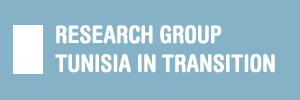Workshop on Political Counseling at the think tank Center for Applied Policy Research (C·A·P)
The second day of the workshop took place in the inspiring belle-époque library of the C·A·P, a think tank at Munich University. The C·A·P proved to be the perfect setting for this part of the workshop, as the day was devoted to building bridges between academia and politics.
Various external speakers gave the participants an insight into their career paths and current jobs, ranging from business consultancy over work in the state administration to being a researcher in a think tank. The session was opened by Elyes Ghariani, the Tunisian ambassador to Germany, who underlined the value of the German-Tunisian academic cooperation. Taking into account the difficult situation of social science graduates, in particular in Tunisia, and the need to develop the field of political consulting, this workshop session was designed to advise the participants in how to excel at political consulting and to present options of how to find a job in this field both in the public and private sector.
To start with, Mathieu Rousselin, Selima Ben Salem and Anis Ben Amor gave an insight into the German and Tunisian labour markets, and the job situation of social scientists in particular. Dr. Mathieu Rousselin is an Associate Postdoc Fellow at the Centre for Global Cooperation Research (Käte Hamburger Kolleg) and Lecturer in International Relations at the University of Duisburg-Essen. He studied Political sciences and international affairs at the Institut d’Etudes Politiques in Paris and the College of Europe (Bruges, Belgium). Mr. Rousselin pointed out five different sectors in which social science graduates can work. These are education and research, the government, the non-profit sector, the private sector as well as journalism. As a study by the University of Duisburg showed, however, only one percent of political science graduates from said university made their way into political jobs in the narrow sense (working as assistants for MPs or in International Organisations). A further 6% works in the administration. One third of graduates go into the private sector. After presenting these statistics, Mr. Rousselin gave the participants some recommendations on how to apply and how to cope with rejection letters. He stressed the importance of having a network and knowing foreign languages. Furthermore, he reminded the participants that social factors also play a significant role in job interviews. Mr. Rousselin’s European perspective was complemented by the rather pessimistic view on the Tunisian labour market, presented by research fellow Selima Ben Salem and the Tunis project coordinator Dr. Anis Ben Amor. Ms. Ben Salem pointed out that the social sciences in Tunisia suffered from a great devaluation, particularly in comparison to natural sciences. In addition, the Tunisian university system lacked contact with the world of work. Students are not prepared to enter the employment market by way of an internship and are therefore deprived of opportunities to gain first experiences.
The first speaker to share her job-experience was Anne Leiding. She is a senior official at the department of international relations of the Bavarian State Chancellery, responsible, among others, for North Africa. Having worked as a judge before, Ms Leiding stressed that many careers cannot be determined in advance. In her job, she found that soft skills such as politeness, patience and the ability to make contact with strangers were of crucial importance. She encouraged all participants and especially women, to apply for any job that they would like to do, even though they might not fulfill all the requirements stated in the job advertisement. “No one is ever at the height of a new job”, so you should always give it a go.
The three subsequent speakers, all political science graduates, gave further insights into the world of political counseling. Daniela Hobi, vice director of the Swiss Think Tank foraus – Forum Außenpolitik (Forum on Foreign Policy) described the “ingredients” that a good think tank needs to be a veritable bridge between science and politics. Just as the speakers before her, she pointed out that a good network is a true asset. Founded as recently as 2009 as a volunteer movement, one of foraus’ additional strengths is also that it is made up of young people, who are unconventional and not already caught in the system. Ludwig Schulz, Regional Manager and head of the Munich office of the German Near and Middle East Association (NUMOV), who is also affiliated with the German Orient Institute (DOI) in Berlin and with the C·A·P, showed that a think tank might not only be designed to consult politics, but also to consult the private sector, as NUMOV is an association constituted of 600 (mainly German) companies and does research for their purpose. With the private sector less known to the participants as possible field of work, Christine Straßmaier’s ensuing presentation was of great interest to the participants. She works as a consultant for travel security and crisis management at Munich based “Corporate Trust”, where she advises small and medium size companies on security evaluation and travel security. As for Tunisia, Ms. Straßmaier saw particular need for research and business consultancies in the area of white collar crime and corruption.
These presentations of practitioners about different working opportunities were complemented by an interactive training. In two groups, the German and Tunisian fellows designed concepts for a business consultancy and a think tank. Both groups worked intensely and came up with innovative ideas. The second day of the workshop thus succeeded in building a bridge between research and the “real world” and gave the participants practical advice and fresh ideas on what to do after graduating.
